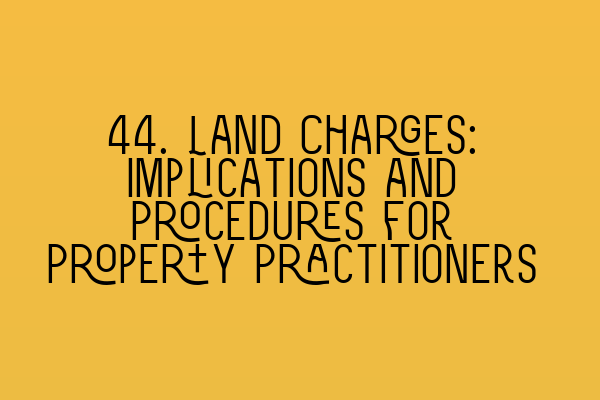44. Land Charges: Implications and Procedures for Property Practitioners
Welcome to SQE Property Law & Land Law, your trusted source for expert advice and guidance in all matters related to property law. In this comprehensive blog post, we will be exploring the topic of Land Charges and their implications for property practitioners. Whether you are a solicitor, conveyancer, or property professional, understanding the procedures and implications of Land Charges is essential to ensuring the smooth and efficient handling of property transactions.
What are Land Charges?
In simple terms, Land Charges are restrictions or interests that affect a property and are not typically registered with the Land Registry. These charges can be created by statute, common law, or by agreement between parties. They often serve as a notice to potential buyers or lenders of any encumbrances or legal obligations attached to a property. Failure to consider and address Land Charges can lead to complications and disputes in property transactions.
Types of Land Charges
There are various types of Land Charges that property practitioners need to be familiar with. Some of the most common ones include:
- Chancel Repair Liability: This charge requires the owner of a property to contribute towards the repair and maintenance of the local church.
- Class F Land Charge: A charge that protects certain types of long leases from being overridden by a purchaser of the freehold.
- Crown Charges: Charges that arise from debts owed to the Crown, such as unpaid taxes or fines.
- Legal Aid Charges: Charges that arise from unpaid legal aid or legal representation fees.
- Restrictive Covenants: These are private agreements between landowners that restrict the use of land or impose specific obligations on future landowners.
These are just a few examples, and there are many more types of Land Charges that property practitioners need to be aware of. Understanding the implications and procedures associated with each is crucial to ensuring a successful property transaction.
Implications for Property Practitioners
Ignoring or overlooking Land Charges can have serious consequences for property practitioners and their clients. The key implications include:
- Risk of Financial Loss: Failing to identify and address Land Charges can result in financial loss for clients, as they may be required to pay unexpected debts or obligations associated with the property.
- Disruption to Property Transactions: Discovering Land Charges late in a property transaction can lead to delays and complications, impacting the smooth progress of the transaction and potentially jeopardizing the deal.
- Liability and Professional Negligence: Property practitioners have a duty of care to their clients, and failure to identify and address Land Charges can expose them to potential claims of professional negligence.
As property practitioners, it is essential to undertake thorough due diligence to identify any potential Land Charges and advise clients accordingly. This includes conducting Land Charges searches and reviewing relevant legal documents.
Procedures for Addressing Land Charges
When dealing with Land Charges, property practitioners need to follow a set of procedures to ensure their clients’ interests are protected. Some of the key steps include:
- Conducting Land Charges Searches: Property practitioners should conduct thorough searches to identify any registered and unregistered Land Charges affecting the property.
- Reviewing Legal Documents: Careful review of legal documents, such as title deeds, leases, and conveyancing documents, will help uncover any obligations or restrictions attached to the property.
- Advising Clients: Based on the findings of the searches and documentation, property practitioners must provide clear and concise advice to their clients regarding the implications of the Land Charges and any steps that need to be taken to address them.
- Negotiating with Relevant Parties: In some cases, it may be necessary to negotiate with the parties involved in the Land Charges to reach a resolution that satisfies all parties involved.
- Updating and Registering: Once the Land Charges have been addressed, it is crucial to update relevant legal documents and register any necessary changes with the appropriate authorities.
By following these procedures and ensuring thorough due diligence, property practitioners can mitigate the risks associated with Land Charges and facilitate smooth property transactions for their clients.
Conclusion
Land Charges play a significant role in property transactions, and understanding their implications and procedures is essential for property practitioners. Ignoring or overlooking Land Charges can lead to financial loss, transaction disruption, and potential liability. By conducting comprehensive searches, reviewing legal documents, advising clients, and addressing Land Charges proactively, property practitioners can ensure the successful completion of property transactions for their clients.
For further resources and preparation for the SQE exams, we invite you to explore our related articles:
- SQE 1 Practice Exam Questions
- SQE 1 Practice Mocks FLK1 FLK2
- SQE 2 Preparation Courses
- SQE 1 Preparation Courses
- SRA SQE Exam Dates
At SQE Property Law & Land Law, we are committed to providing the highest level of expertise and support to property practitioners. Contact us today for all your property law needs.
